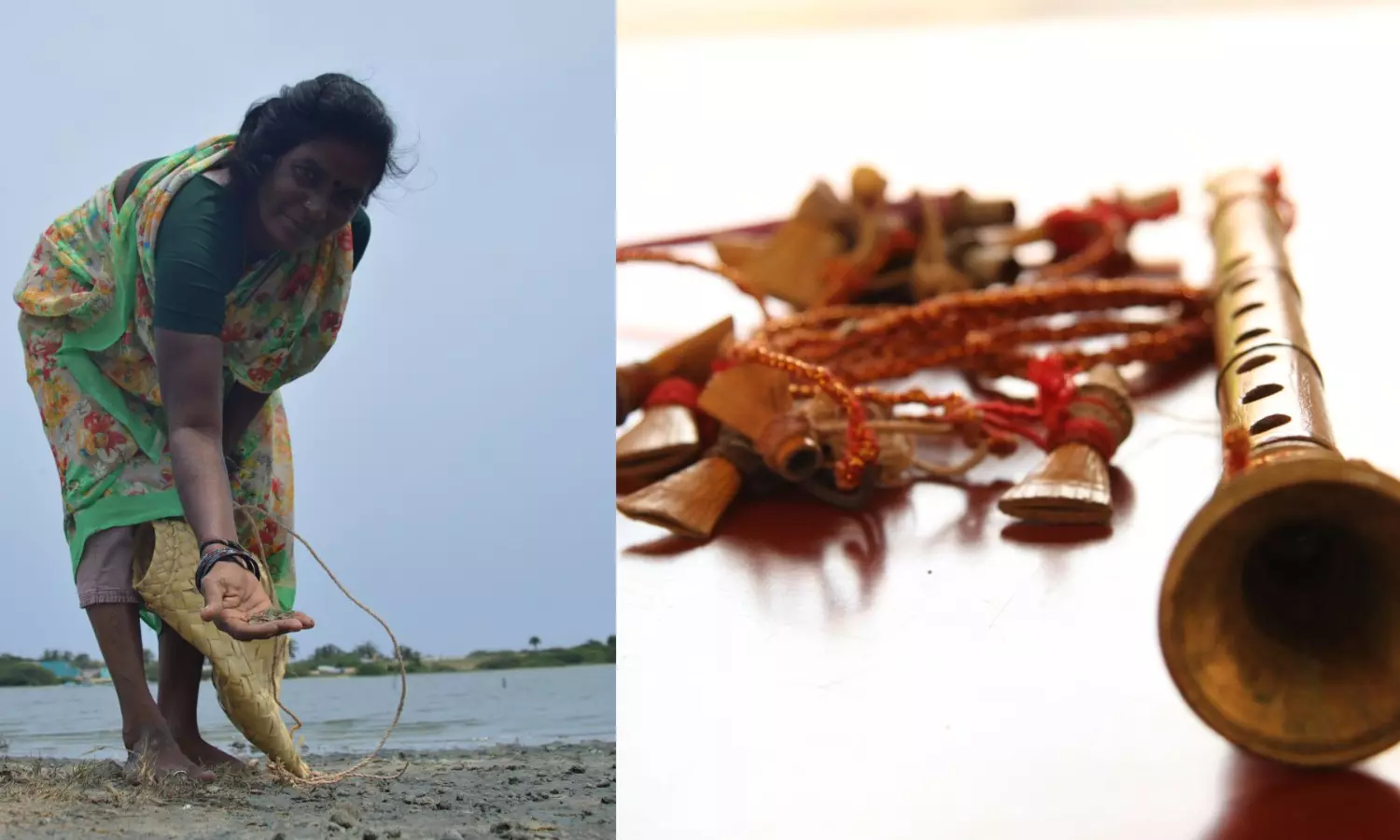Margins to mainstream: Symposium in Chennai to unearth porombokkiyal’s voices
Often, marginalised people living in poromboke lands possess valuable knowledge of sustainable practices and cultural traditions. Featuring women prawn pickers, goat herders, and local musicians, this event celebrates the rich knowledge found in the commons;

A prawn picker, Mukavinai instrument
CHENNAI: The term ‘poromboke’ (commons) is often used as an insult but refers to land reserved for communities to share and use. People and occupations in poromboke areas are usually neglected, yet they hold valuable knowledge. To highlight the skills and scientific understanding of those living in these shared spaces, Chennai Kalai Theru Vizha will host a symposium called Porombokkiyal: a people’s symposium on the arts, sciences, and scientists of the commons. This symposium celebrates the spirit of the poromboke commons by featuring living traditions of scientific, artistic, and livelihood expertise rooted in the community. This edition will feature four conversations that showcase the experiential knowledge of the speakers as they discuss their respective trades.
When asked about the significance of poromboke today, TM Krishna, the founder of Chennai Kalai Theru Vizha, says, “The term poromboke has become an insult in Tamil culture. However, poromboke is a beautiful concept; it encompasses geographical, cultural, social, political, and philosophical aspects. Poromboke, or commons, is shared by everyone and has no private ownership. It doesn’t discriminate against people or nature. It includes trees, lakes, rivers, marshlands, and grazing lands and even people living there, who are among marginalised groups.”

TM Krishna
He points out that the occupations of people living in the commons are seen as insignificant. “People living there are often regarded as having no significance, along with their knowledge, ideas, and the science behind their work, which are ignored or discarded. The symposium aims to challenge this incorrect notion.”
Scholars from universities often meet people from poromboke areas, gather their ideas, and become voices of knowledge they don’t truly possess. “The vocabulary used in academia can elevate certain ideas to the status of knowledge simply by using the right terms. The upcoming symposium challenges this idea, asserting that knowledge-bearers exist in every community and have passed down their expertise for generations. They have their own ways of expressing knowledge through unique vocabulary and cultural practices. However, mainstream society often struggles to understand these different perspectives, leading to these voices being ignored. The symposium will be a platform for these organic intellectuals to share their stories. By listening to them, we can challenge our assumptions and recognise the value of their contributions,” TM Krishna tells DT Next.
Women prawn pickers from Pazhaverkadu will share their experiences of working on the shores; these women catch prawns by hand, wading through the water. Their demanding work requires a deep understanding of the river’s sediment and aquatic life. “If you ask a prawn picker, she can explain how to identify a good prawn. Thangavelu, a goat rearer, will discuss their grazing practices and how they notice details in goats, learned through generations of experience. Sasikumar P, a mukavinai player from Kanchipuram, will explain how his instrument differs from the nadaswaram and the unique way it is played. Lenindhasan and Baskar Manimegalai from Thiruvannamalai will discuss paddy cultivation,” he introduces the speakers.
Baskar, Sasikumar, Thangavelu (a goat rearer)
The musician points out that the beauty of the commons lies in its free sharing among communities. “When science or art is privatised and owned by a select few, we often consider it as more legitimate or advanced. However, some of the most beautiful forms of art and valuable scientific knowledge exist in the commons, shared selflessly by people who don’t keep it exclusive to a small group. This is why the science and arts of the commons should be highlighted, respected, and learned from those who have practised them for generations,” concludes TMK.
The event will be held on October 2, at The Folly, Amethyst, Royapettah.

